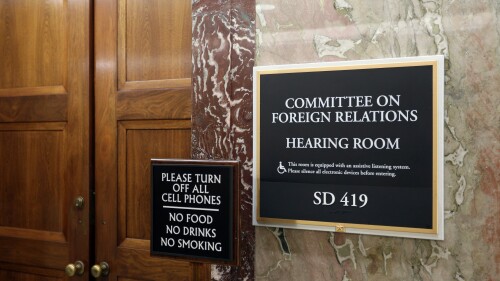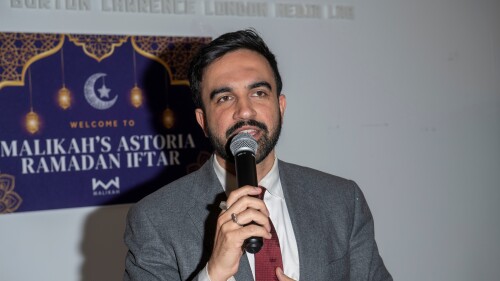Following anti-Israel protests that raged across college campuses, state governments are passing laws to protect students from malign foreign influences in higher education. In the absence of federal legislation, state officials are concerned that foreign “countries of concern” are corrupting young minds to adopt hostile attitudes towards America and other Western democracies.
On May 6, Alabama’s governor, Kay Ivey, a Republican, signed House Bill 330, an act requiring public universities and private nonprofit colleges to report foreign gifts originating from a list of five hostile countries. The bill, introduced by Representative Matt Woods of the Alabama House, is the first legislation of its kind to target Qatar, a supposed American ally that invests more than any other country in American colleges.
The bill, introduced by Representative Matt Woods of the Alabama House, is the first legislation of its kind to target Qatar, a supposed American ally that invests more than any other country in American colleges.
Alabama’s foreign influence bill comes as college campuses contend with a staggering surge of antisemitism. Beginning in April, anti-Israel encampments at several elite universities have featured expressions of support for Hamas and the October 7 massacres in Israel, with outbursts of violence aimed at Jewish students.
“With the escalation of anti-Semitic behavior on college campuses nationwide, it is vital to track funding sources from foreign countries of concern to ensure transparency and security,” Mr. Woods wrote in an email.
Since 1981, a reported $40 billion has flowed to top American academic institutions through foreign sources, which finance entire departments, faculty positions, and research projects through multimillion dollar grants and endowments. These investments — though not intrinsically harmful — allow foreign nations to shape elite culture and mold the next generation of American policymakers.
That’s not all. Malign foreign influences from designated countries of concern advance the geopolitical interests of America’s adversaries.
Two Chinese Communist Party initiatives — the Confucius Institute and Thousand Talents Program — place Chinese nationals inside collegiate research institutions, enabling the wholesale theft of proprietary American research in key sectors like military tech and robotics.
Likewise, Russian spies enrolled as students at Columbia, Harvard, and American University have used their cover to cultivate relationships with political power brokers and gain access to sensitive information.
Middle Eastern autocracies pose a unique ideological threat. The Islamic Republic of Iran has seemingly planted regime loyalists into elite institutions of higher learning, where they use the prestige afforded by their faculty positions to promote Tehran’s anti-American interests.
Despite its status as a “Major Non-NATO Ally,” Qatar’s forays into American academics deserve special scrutiny.
Since 2001, the gas-rich kingdom has pumped at least $4.7 billion into American universities, most of which went unreported to government authorities, despite federal regulations mandating public disclosure of foreign contributions in excess of $250,000.
Despite its status as a “Major Non-NATO Ally,” Qatar’s forays into American academics deserve special scrutiny.
Qatar — a sponsor and financial supporter of Hamas and other terrorist groups — uses education as a vehicle for indoctrinating Western students on a steady diet of pro-Islamist and anti-Israel teachings. Schools that accept money from Qatar experience increased cases of antisemitic incidents, according to a study from the Network Contagion Research Institution at Rutgers University.
The “Deterrent” Act, which passed the House in December, seeks to address this problem by lowering the reporting threshold for gifts from foreign adversaries to $0, while schools would have to publicize the purpose behind every foreign donation. Critically, non-compliance would trigger steep fines.
Yet, as the bill languishes in the Senate Finance Committee with few signs of advancing, and with existing federal laws failing to protect students, states that invest substantially more than the federal government in higher education are taking matters into their own hands.
Alabama joins other states that have passed or introduced their own foreign influence bills — some with very strict provisions. A Florida law passed last year bars gifts and contracts of any kind from a list of seven countries of concern, and it prohibits student recruitment programs from these nations. Oklahoma, Michigan, and Illinois have introduced similar measures in current legislative sessions.
Republican-dominated legislatures are leading the nation in introducing these urgent reforms. However, in states where foreign influence safeguards are most urgently needed — at Ivy League institutions and other elite colleges in the Northeast — America’s adversaries continue to exploit loopholes in federal reporting laws.
Despite these alarming trends, the higher education lobby is adamantly opposed to any legal protocols governing foreign gifts and academic partnerships. Therefore, it is up to private citizens to advocate for change at the state and federal level. With the Fall semester right around the corner, lawmakers should move quickly to close loopholes and pass new laws that target hostile Middle Eastern regimes, lest they surrender America’s classrooms to its geopolitical enemies.








